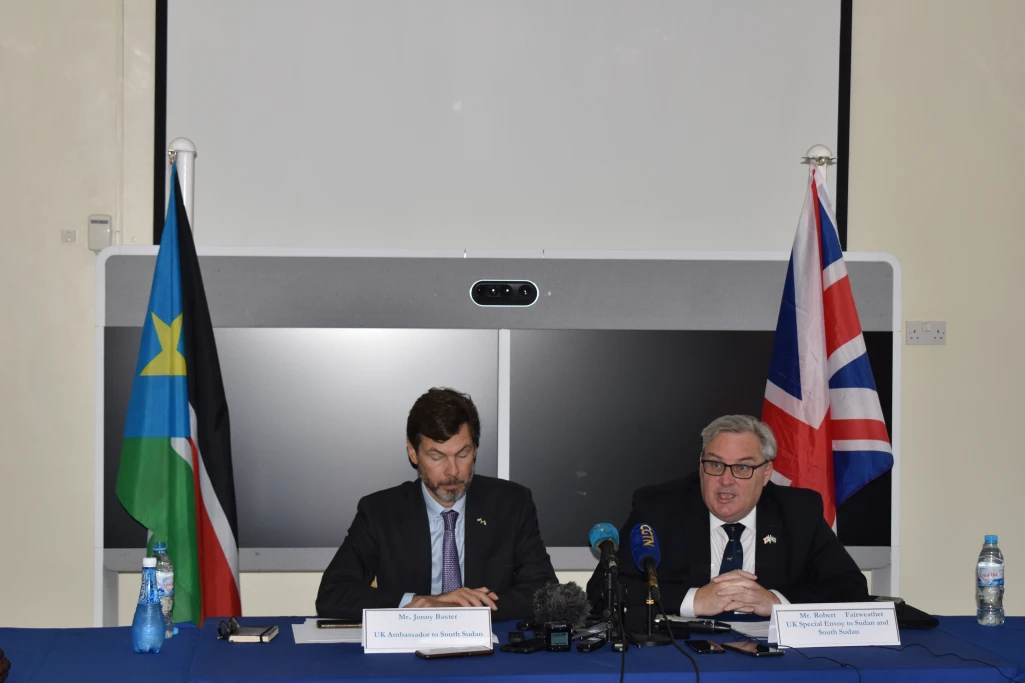
The United Kingdom Special Envoy for Sudan and South Sudan is calling for an all-inclusive roadmap that incorporates the views of all stakeholders.
Robert Fairweather said all the signatories to the 2018 revitalized peace agreement must engage constructively in discussions over any plans to extend the transitional period.
The current transitional period is expected to an end in the next six months although most of the provisions in the peace deal have not been implemented. But there are ongoing discussion to yet again extend the transitional period.
Last month, President Kiir received a roadmap on how the transitional period should end and to usher the country into democratic elections. The revised timeframe is set to be presented to the presidency although the First Vice President, Dr. Riek Machar has rejected it – saying the document does not reflect the views of all parties to the revitalized peace agreement.
The drafting of the roadmap was spearheaded by the chairperson of the National Transitional Committee, Tut Gatluak, Minister of Cabinet Affairs, Dr. Elia Lomoro and Minister of Information, Michael Makuei Lueth.
In a media conference on Tuesday in Juba, Robert Fairweather agrees that there is need for wider consultations.
“The whole process must be inclusive and all parties must be consulted and it must be clear why decisions around this roadmap are being made and certainly this will build confidence,” he stated.
The envoy also called for the inclusion of all stakeholders in the consultation process “such as civil society leaders who are the representatives of the people of South Sudan.”
The slow pace of the implementation of the 2018 peace deal has been attributed to a lack of political will and funding by the unity government. Its partial implementation has largely depended on external funding from international donors such as the United States, United Kingdom, Norway, Canada, and European Union.
In July, the United States dealt a blow to the parties by announcing it has pulled out support for peace peace monitoring bodies; RJMEC and CTSAMVM. It cited lack of will from the leaders to implement the agreement.
The UK diplomat said the message among the international partners for South Sudan is consistent.
“What we have been saying to those we met which is vital is – there need to be political will and the question need to be answered –what will be difference this time?” Fairweather asked in reference to plans to extend the transitional period.
“We have seen extension before…any actions that are taken from now – be it extension or a roadmap, we must see immediate actions which help the people and…to show that…people are serious in terms of the implementation.”
Crucial reforms unrealized in the 2018 peace deal include institutional reforms, enactment of permanent constitution, graduation of unified forces, funding of reparation and reconciliation bodies, among others.
Robert Fairweather further outlined the UK’s expectation over the roadmap.
“What we would like to see is a roadmap which set the details of what actions will be taken, who is responsible for the delivery of those actions, a timeframe and how the implementation will be funded,” he said.
“What the people of South Sudan want is a country that is stable enough to have an election and if you are going to move toward that, a vital element is to ensure there is a civic space for people to have political debate,” he emphasized.
For his part, the British Ambassador to South Sudan, Jonny Baxter urged the parties to exert all efforts in implementing all the provisions within the revitalized peace agreement.
“The best and indeed the only vehicle to secure a lasting peace remains the peace agreement that was reached by the parties in 2018. This peace agreement remains the only path to peace, prosperity, accountability, transparency and stability in South Sudan,” he underscored.
On July 7, President Salva Kiir – during a mass presided by the Vatican Secretary of State, His Eminence Cardinal Pietro Parolin – pledged to steer South Sudan towards permanent peace and stability despite obstacles he said are contributing to the slow-paced implementation.